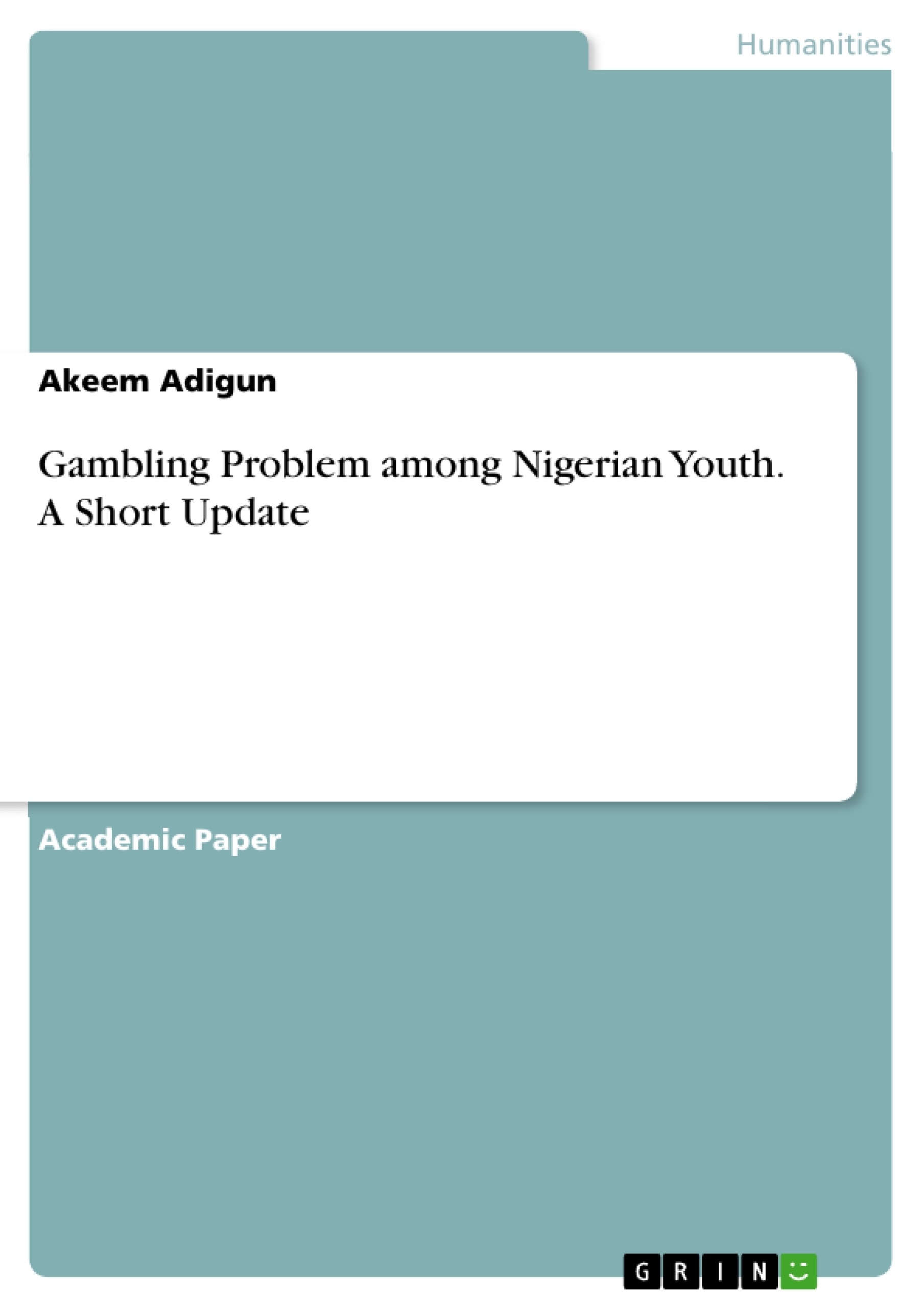This paper presents the update on problem gambling among Nigeria youth; looking at its prevalence, forms, the industry, causes and effects, empirical review of previous studies and its counselling implications. Gambling among youth remains a salient problem that is less recognised as a social menace among education stakeholders and researchers. This is because it is a common phenomenon that is considered as recreational activity and even legalised by Nigeria government through which revenue are generated (tax collected from the owners of various gambling companies). However, experts have noted that it causes more harm to the youth and the society than the good it may seem to portray.
Inhaltsverzeichnis (Table of Contents)
- Introduction
- Problem Gambling among Nigerian Youth
- Causes and Effects of Problem Gambling
- Gambling in any form increases the likelihood of participation in other forms of gambling.
- Problem gambling can destroys one’s relationship with family, friends, and colleagues.
- Systematic Review of Previous Empirical Studies
- The research effort by Erickson, Molina, Ladd, Pietrzak and Petry (2005), explored the association of problem and pathological gambling with poorer mental and physical health in older adults.
- In another research, Enwereuzor, Ugwu and Ugwu (2006) worked on the role of smartphone addiction in gambling passion and schoolwork engagement: A Dualistic Model of Passion approach.
- Onyedire, Chukwuorji, Orjiakor, Onu, Aneke and Ifeagwazi (2009) studied the associations of Dark Triad traits and problem gambling: Moderating role of age among university students.
- Nwigwe, Yusuf and Okoruwa (2010) worked on the determinants of demand for gambling/office football pool betting in Ibadan, Oyo state, Nigeria.
- Furthermore, Oyebisi, Alao and Popoola (2012) conducted another study entitled gambling behaviour of university students in South Western Nigeria.
- Chimezie (2015) conducted a study entitled prevalence and determinants of gambling behaviours among undergraduate students (a case study of Federal University of Oye- Ekiti) in Ekiti State, Nigeria.
- The study of Akanle and Fageyinbo (2015) on football betting in Nigeria; revealed that majority of the respondents saw a connection between soccer betting and the prior existence of Lotto (lottery) which has probably prepared the minds of the residents of Ibadan metropolis for the more sophisticated soccer betting.
- Abayomi, Adebayo, Adelufosi, Ibrahim, Mosanya, Suleiman, et. al., (2016) examined the risky substance use among patrons of gambling venues in Ogbomoso, Oyo State, Nigeria.
- Oyeleke, Ajibewa and Adebayo (2018) studied the personality traits and cognitive distortions as predictors of pathological gambling among lottery gamblers in Ibadan Nigeria.
- Omanchi and Okpame (2018) investigated the changing patterns of gambling in Benue State: The case of emerging role of ICT (Information and Communications Technology) in contemporary Makurdi metropolis.
- Bankole, Oyekola and Bankole (2019) conducted a study on personality traits and financial strain as determinants of gambling behaviour among youth in Nigeria: A case study of youths in Oyo State and Ekiti State.
- Implications for Counselling
- Conclusion and Recommendations
Zielsetzung und Themenschwerpunkte (Objectives and Key Themes)
This paper examines the problem of gambling among Nigerian youth. The paper provides an update on the prevalence, forms, causes, and effects of problem gambling in Nigeria. It presents a systematic review of previous empirical studies and explores the implications of these findings for counselling. The paper aims to raise awareness about problem gambling among education stakeholders and researchers, and to encourage the development of counselling programmes to address this issue.- Prevalence and forms of gambling among Nigerian youth.
- Causes and effects of problem gambling on individuals, families, and society.
- Review of empirical studies examining problem gambling in Nigeria.
- Counselling implications for addressing problem gambling among Nigerian youth.
- Recommendations for combating problem gambling and its associated risks.
Zusammenfassung der Kapitel (Chapter Summaries)
The introduction of this paper defines gambling and its various forms, highlighting its prevalence and economic significance in Nigeria. The paper explores the history of gambling, tracing its origins and evolution to the present day. It also discusses the legal framework surrounding gambling in Nigeria, specifically the National Lottery Act of 2005. The second chapter focuses on the prevalence and characteristics of problem gambling among Nigerian youth. It defines problem gambling as a bio-psychosocial disorder, and discusses its impact on individuals and society. The chapter also highlights statistics on gambling among young people in sub-Saharan Africa, emphasizing the need to address this issue in Nigeria. The third chapter explores the causes and effects of problem gambling. It examines the economic factors, social influences, and psychological vulnerabilities that contribute to gambling addiction. The chapter also discusses the negative consequences of problem gambling, including financial ruin, relationship breakdown, and mental health problems. The fourth chapter presents a systematic review of previous empirical studies related to problem gambling in Nigeria. It examines the findings of various research projects that have investigated the prevalence, risk factors, and consequences of gambling among youth. The chapter highlights the importance of understanding these findings to develop effective prevention and intervention strategies.Schlüsselwörter (Keywords)
The main keywords and focus topics of this paper include problem gambling, gambling addiction, Nigerian youth, systematic review, empirical studies, counselling implications, prevalence, causes, effects, prevention, intervention, and social policy.- Quote paper
- Akeem Adigun (Author), 2020, Gambling Problem among Nigerian Youth. A Short Update, Munich, GRIN Verlag, https://www.grin.com/document/538173



